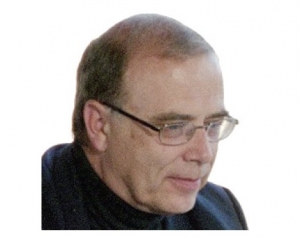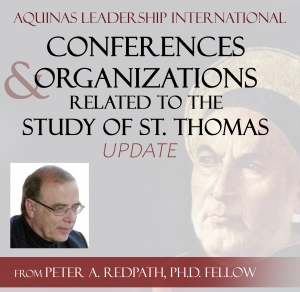The Methodology of the Adler-Aquinas Institute by Prof. Peter A. Redpath

Peter Redpath
Strictly speaking, the Adler-Aquinas Institute (“AAI”) does not consider philosophy and science to be distinct disciplines. Strictly speaking, the Institute considers them to be identical. Moreover, the Institute does not consider science, philosophy, chiefly to be a logical system, or body of knowledge. It considers science, philosophy, to be the act of a habit of soul. And it considers science, philosophy, wisdom impossible to achieve if the relation between subjects that philosophy studies are divorced from the faculties, habits of soul through which an object of knowledge becomes transformed into a scientific or philosophical subject of study.
Furthermore, a distinct similarity exists between the approach to that Étienne Gilson used to revive interest in medieval studies and study of St. Thomas and that Adler used to revive interest in Western classics and the study of St. Thomas. Gilson focused on Great Books of antiquity and the middle ages. Adler focused on Great Books of the Western World. Here is a brilliant observation that Adler made about how we are able to find the key to answering difficult questions about important and difficult intellectual issues:
“We should recognize . . . that our task as syntopical readers is not merely to answer questions ourselves—the questions we have so carefully framed and ordered both to elucidate the discussion and the subject of the discussion itself. The truth about a problem of this sort is not found so easily. In fact, we would probably be presumptuous to expect that the truth could be found in any one set of answers to the questions. Rather, it is to be found, if at all, in the conflict of opposing answers, many if not all of which may have persuasive evidence and convincing reasons to support them. No truth is well understood until and unless all the errors it corrects are also understood and all the contradictions found are resolved. It is in the context of a plurality of errors to be corrected and of contradictions to be resolved that the brilliance of truth shines out and illuminates the scene.”
In the above quote Adler realized that we can only find the definition we need to answer difficult questions by first getting common agreement about how to frame the right question (if we do not do this, the members of a discussion are not talking about the same proximate genus that they need to talk about to find the precise definition that helps solve their common problem; if they are talking about a different generic subject, they are not talking about the same problem). As Gilson says, most philosophical mistakes start with badly framed questions. Without repeated objections and failures in trying to define the difficult problem we are trying to solve, we cannot precisely locate the proximate genus and specific difference that comprise the definition that helps solve the problem. This is true whether we are talking about theoretical, practical, or productive definitions.
Michelangelo needed repeated failures to perfect his paintings and sculptures. Galileo Galilei needed repeated failures to perfect his principles of astronomy. Great military leaders need to experience repeated failures to become great military leaders. We needed repeated failures before we could perfect this Great Books program. And the same is true of leaders in all other fields: sports, business, religion, and so on.
The chief reason for this is that we cannot progress in learning without making our thinking more precise. Disagreements, objections, failures are the essential enabling means for making our thinking more precise because they are the essential enabling means for discovering generic and specific differences that help us refine the definitions we use as first principles of discovery in all divisions of learning. To solve a problem or answer a difficult question we must first narrow down our quest by precisely defining the problem or precisely frame the question we are seeking to answer. But we cannot precisely define a problem or define a question without, in some way, recognizing some difference or common object of pursuit we are seeking that only a more precise definition can provide. We cannot discover the solution to any problem, especially a difficult one, without first discovering some specific difference that makes this problem unique, that separates it from other problems that closely resemble it. Without the help of failure, objections from others, hitting a brick wall in our thinking, difficult arguments to answer, or crises, we can rarely make this discovery. Without such help, at times, we might not even know we have a problem we need to answer.
And, even once we precisely frame a problem or question that is difficult to solve, except through luck, native genius, or miraculous intervention, without the help of further failure, arguments, objections, most of us can never hope to answer it. The reason for this is that we answer difficult problems and questions by means of precise arguments. We can never arrive at precise arguments without using precise definitions. Since we can never arrive at precise definitions without understanding precise differences that exist among a group of beings that share something in common, without the help of failure, objections from others, difficult arguments to answer, or crises, we can never find that precise difference that separates a smaller class of beings from a larger one and arrive at a precise definition.
This is the reason why great physical scientists must engage in so many experiments, great philosophers have to be able to answer many major objections, and why dealing with repeated failures is an essential enabling means for producing great leaders. The way we go about discovering these differences differs in different areas of learning. Mathematical physicists and medical researchers discover this difference chiefly by means of experiment. Athletes discover it by mainly by means of athletic competition. Philosophers and theologians tend to discover it by means of verbal argument. And people in business, politicians, and cultural leaders tend to discover it by economic failure, political conflicts, and cultural crises.
As Adler and Gilson recognized, this way of pursuing answers to questions is part of the unique methodology of St. Thomas Aquinas. And it is the methodology unique to the AAI program.
– Prof. Peter A. Redpath
